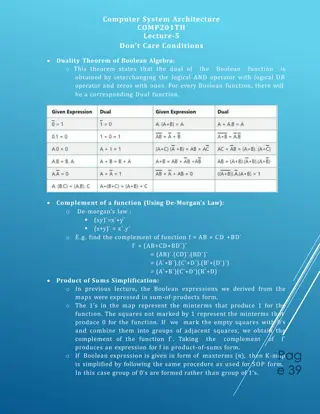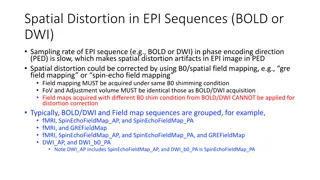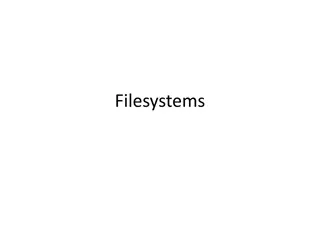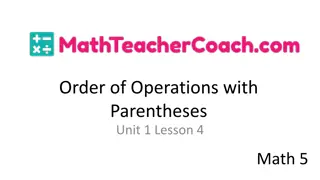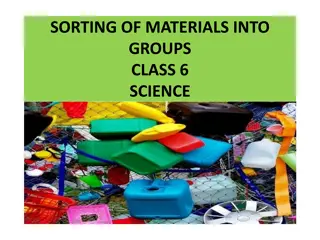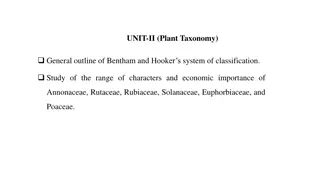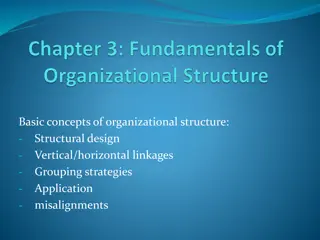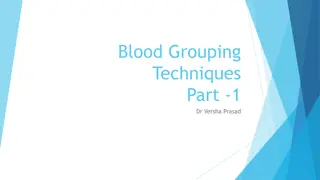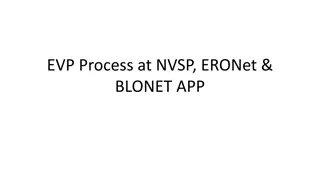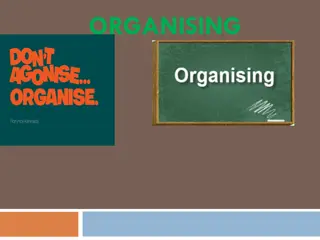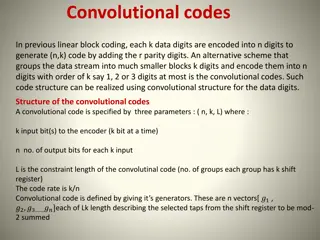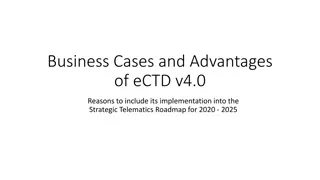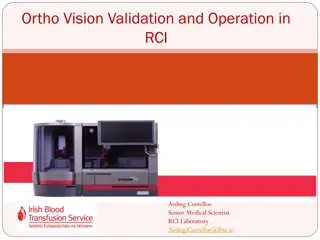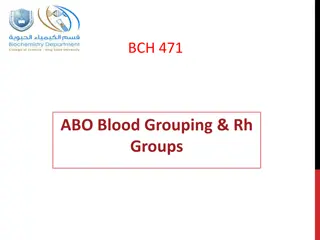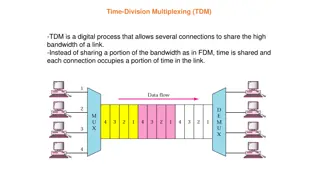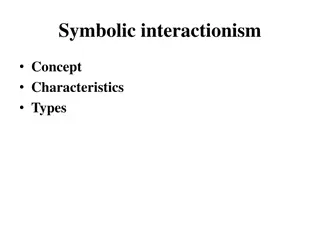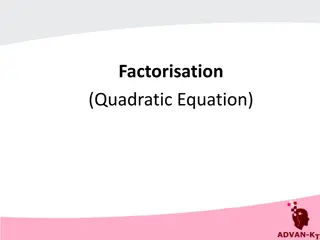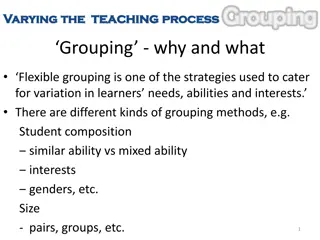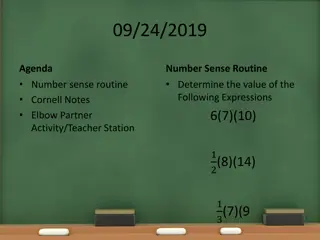Transfusion
Blood transfusion is a crucial medical procedure worldwide, with various components like packed red blood cells, plasma, platelets, and cryoprecipitate being utilized for efficient use. Differential centrifugation is employed for component preparation, ensuring precise separation of red blood cells,
2 views • 45 slides
Comprehensive Overview of mCLASS DIBELS/Lectura Interim Assessment Team
mCLASS DIBELS/Lectura is a comprehensive interim assessment program designed to help educators measure student progress in reading proficiency. The program includes Benchmark assessments, Progress Monitoring tasks, reinforcement activities, specialized grouping, and instant access to scores. With a
2 views • 48 slides
Understanding Boolean Algebra: Duality Theorem, De-Morgan's Law, and Don't Care Conditions
Boolean algebra concepts such as the Duality Theorem, De-Morgan's Law, and Don't Care Conditions are essential for digital circuit design. The Duality Theorem states the relationship between a Boolean function and its dual function by interchanging AND with OR operators. De-Morgan's Law helps find t
0 views • 10 slides
Understanding Anxiety Disorders in DSM-5
Anxiety disorders encompass a range of conditions, from separation anxiety to social phobia and generalized anxiety disorder. The DSM-5 has re-conceptualized these disorders, grouping OCD in its own category and moving PTSD to trauma-related disorders. Recognizing symptoms and seeking appropriate tr
1 views • 96 slides
Understanding Body Plans of Animals in the Animal Kingdom
Introduction to the diverse phyla within the Animal Kingdom, highlighting key features of body plans such as symmetry, cephalization, tissue layers, coeloms, and gut types. Exploring the classification system through common characteristics shared within phyla and the significance of morphology in gr
1 views • 54 slides
Spatial Distortion Correction in EPI Sequences: Field Mapping Examples
Spatial distortion artifacts in EPI sequences (BOLD or DWI) due to slow sampling rates in the phase encoding direction can be corrected using B0/spatial field mapping techniques. This correction requires obtaining field maps under the same B0 shimming conditions and with identical FoV and adjustment
0 views • 4 slides
Understanding Cladograms and Phylogenetic Analysis
Cladograms are used in cladistics to illustrate evolutionary relationships between organisms based on shared ancestral and derived characters. They are created by grouping species by common descent, forming clades that include an ancestral species and all its descendants. Valid clades are monophylet
0 views • 11 slides
Understanding Filesystems: A Comprehensive Overview
File systems provide a structured approach to storing and organizing data on secondary storage devices. They involve logical organization of files, directories for grouping related files, sharing data between users, and managing permissions. Files contain data with attributes like size, ownership, a
3 views • 29 slides
Understanding Order of Operations with Parentheses
Explore the importance of grouping symbols in numerical expressions with parentheses, brackets, and braces. Learn how to identify and evaluate expressions following the PEMDAS rule and the funnel method. Master key vocabulary and solve problems involving order of operations in mathematical expressio
1 views • 41 slides
Understanding Material Classification and Properties in Science
Explore the importance of grouping materials based on their properties, such as appearance, hardness, solubility, density, and transparency. Discover how materials are classified and grouped, benefitting us in organization, efficiency, and study. Learn about the significance of material characterist
0 views • 15 slides
Exploring Proverbial Pairs in the Book of Proverbs
Delve into the organization and interpretation of proverbial sayings in the Book of Proverbs, examining the context, grouping, and intent behind the collection. Discover prevalent pairs, cohesive variations, and modern twists on traditional proverbs like "Absence makes the heart grow fonder" versus
0 views • 41 slides
Understanding Numeration Systems in Indian and International Number Writing
Explore the differences between Indian and International Numeration Systems used for writing numbers. Indian system uses ones, tens, hundreds, thousands, lakhs, ten lakhs, and crores with commas to mark each digit grouping. International system includes ones, tens, hundreds, thousands, and millions.
0 views • 10 slides
Overview of Bentham and Hooker's Classification System in Plant Taxonomy
Bentham and Hooker's system of classification in plant taxonomy, outlined in Genera Plantarum, provided detailed descriptions of families and genera based on original plant dissections. This classification system has practical value for plant identification, with keys for taxa and subdivisions for l
2 views • 47 slides
Important Information for Year 5/6 Students and Parents
This document contains essential details for Year 5/6 students and parents, including information about the end phase team, curriculum coverage, grouping in Maths and English, water bottle policy, homework expectations, P.E. schedule, and a vocabulary list for years 5 and 6.
0 views • 7 slides
Support Strategies for Schools During the COVID-19 Pandemic
In response to the challenges brought by the COVID-19 pandemic, this guide offers support strategies for schools, emphasizing the importance of adapting teaching methods, providing targeted support, and implementing wider strategies to benefit all students, especially those disadvantaged. The guide
1 views • 13 slides
Understanding Antigen-Antibody Reaction: Agglutination Tests and Coombs' Antiglobulin Test
Learn about the principle and types of agglutination tests, including slide and tube agglutination, used for identifying bacterial isolates and blood grouping. Discover the importance of Coombs' test in detecting incomplete antibodies. Explore the applications and techniques involved in these immuno
2 views • 13 slides
Understanding Agglutination Reactions in Immunology
Agglutination reaction is a key technique in immunology where particulate antigens and antibodies clump together in the presence of electrolytes. This reaction is highly sensitive and often used for antibody detection, bacterial identification, blood grouping, and cross-matching. The process involve
0 views • 20 slides
Target Setting for Geography Session to Enhance Learner Performance
Informed by analytical reports, the target setting strategy aims to increase learner attainment in geography, with a goal of 80% achieving a distinction and 30% passing. Responsibilities include providing resources, implementing strategies before exams, and focusing on learners' strengths. The diffe
0 views • 14 slides
Understanding Organizational Structure and Vertical/Horizontal Linkages
Organizational structure encompasses formal reporting relationships, department grouping, and system design for effectiveness. By structuring for efficiency, organizations prioritize vertical communication and centralized decision-making. In contrast, a learning structure emphasizes horizontal commu
0 views • 30 slides
Blood Grouping Techniques: Methods and Advantages
Various blood grouping techniques including slide or tile method and microplate technique are discussed. Advantages of microplate ABO grouping such as cost-effectiveness, automation potential, and reduction in errors are highlighted. The use of different manual methods and newer techniques in blood
0 views • 11 slides
Comprehensive Guide to Online Voter Registration Process at NVSP, ERONet & BLONET App
Navigate through the step-by-step process of online voter registration at NVSP, ERONet & BLONET App. Learn how to verify self-details, check family grouping, handle shifted/dead electors, assist unenrolled citizens, and engage with prospective electors. Explore boundary mapping techniques for creati
0 views • 32 slides
Understanding the Importance of Organising in Management
Organising is a crucial function of management that translates plans into action by ensuring the availability of physical and human resources necessary to achieve business objectives. This process involves defining tasks, grouping activities, and establishing authority relationships within the enter
0 views • 40 slides
Understanding Histograms in Displaying Quantitative Data
Learn how to create and interpret histograms in displaying quantitative data. This lesson covers making histograms, interpreting distributions, and comparing data sets. Understand the importance of grouping data values and creating equal-width intervals for a clearer visualization. Explore the proce
10 views • 16 slides
Understanding Convolutional Codes in Digital Communication
Convolutional codes provide an efficient alternative to linear block coding by grouping data into smaller blocks and encoding them into output bits. These codes are defined by parameters (n, k, L) and realized using a convolutional structure. Generators play a key role in determining the connections
0 views • 19 slides
The Advantages of Implementing eCTD v4.0 into the Strategic Telematics Roadmap
eCTD v4.0 offers several benefits such as harmonized submission units, document re-use through unique identifiers, enhanced life cycle management, and controlled vocabularies for easier updates. It facilitates grouping of documents based on context of use and keywords, automates administrative proce
0 views • 13 slides
Ortho Vision Validation and Operation in RCI
Role of RCI laboratory, analyser requirements, validation process, installation verification, and PQ testing for Ortho Vision system. The RCI laboratory plays a crucial role in various testing processes including blood grouping, antibody ID, and compatibility testing. Validation process includes URS
0 views • 17 slides
Understanding ABO Blood Grouping and Rh Groups
ABO blood grouping and Rh factor testing are crucial for blood transfusions and forensic medicine. The presence or absence of specific antigens and antibodies in human blood determines blood type. Genetic inheritance from parents establishes blood type, with codominance influencing offspring phenoty
0 views • 13 slides
Understanding Time-Division Multiplexing (TDM) in Digital Communication
Time-Division Multiplexing (TDM) is a digital process that enables multiple connections to share the bandwidth of a link by dividing data into time slots. Synchronous TDM organizes data flows into frames with specific time slots for each input connection. Frames are crucial for grouping time slots i
0 views • 9 slides
Understanding Symbolic Interactionism in Sociology
Symbolic Interactionism is a school of thought in sociology that focuses on how individuals interact with each other through symbols, shaping social structures. It highlights the role of symbols in defining actions and meanings in social interactions. The concept explores how different socializing e
0 views • 18 slides
Understanding Amino Acids: Structure, Classification, and Properties
Amino acids are crucial chemical units that form proteins and play essential roles in the body. They consist of a carboxyl group and an amino group, serving as building blocks and metabolic intermediates. This article covers the general structure, zwitterions, isoelectric point, pK values, and class
0 views • 26 slides
Mastering Quadratic Equation Factorization Techniques
Learn various factorization techniques for quadratic equations including grouping 'Two and Two', factorization of a difference of two squares, factorization of quadratic trinomials, cross-multiplication method, and use of common factors. Improve your factorization skills and solve quadratic equation
0 views • 24 slides
Understanding Pivot Tables: A Comprehensive Guide
Pivot tables are powerful tools for reorganizing and analyzing data efficiently. They help in summarizing, sorting, and grouping data to create meaningful reports quickly. Learn about the advantages of using pivot tables and how to create them effectively.
0 views • 13 slides
Medical Faculty Orientation Curriculum Restructuring Overview
This overview outlines the phases of a new faculty orientation curriculum, emphasizing foundational knowledge, core clinical skills, and restructuring goals to enhance career exploration, streamline the curriculum, improve course grouping, and prioritize student well-being in medical education.
0 views • 6 slides
Evolution of Orchestra: From Ancient Egypt to Modern Times
The evolution of orchestras dates back to ancient Egypt, with the Roman Empire showing disdain towards musicians. Instrument families emerged in the eleventh century, while the Middle Ages saw the grouping of specific instrument families. Modern orchestras began in the late sixteenth century, with s
0 views • 24 slides
Multiplying by 3 Numbers Lesson: Associative Property and Problem-Solving
Explore the concept of multiplying three numbers and utilizing the Associative Property of Multiplication. Understand how changing the grouping of factors doesn't affect the product. Engage in problem-solving scenarios involving multiple multiplication operations. Enhance your skills through real-wo
1 views • 20 slides
Essential Considerations for Animal Housing Plan
Preparation and designing of animal houses require careful consideration to ensure attractive appearance, minimize labor costs, increase operational efficiency, and have resale value. The process involves creating a rough plan with site, floor, elevation, cross-section, master plan, Van-Dyke print,
1 views • 9 slides
Enhancing English Classrooms through Flexible Grouping Strategies
Strategies for grouping students in English classrooms are explored, focusing on the benefits of flexible grouping to cater to diverse learner needs. Various grouping methods, such as mixed ability and similar ability groupings, are discussed alongside a lesson example on exploring different aspects
0 views • 32 slides
Algebraic Expressions Lesson Overview
This lesson focuses on writing and reading algebraic and written expressions with grouping symbols and less than. Students will learn how to translate expressions containing groupings and less than. The lesson is designed to build on the previous day's lesson and challenge students' thinking. It set
0 views • 25 slides
Optimizing Multi-Party Video Conferencing through Server Selection and Topology Control
This paper proposes innovative methods for multi-server placement and topology control in multi-party video conferences. It introduces a three-step procedure to minimize end-to-end delays between client pairs using D-Grouping and convex optimization. The study demonstrates how combining D-Grouping,
0 views • 13 slides
Enhancing Logical Grouping Mechanisms in Haystack Labs
Formalizing a logical grouping mechanism to standardize practices, promoting extensibility and alignment with existing work in Haystack Labs. Examples illustrate the flexibility and advantage of the system.
0 views • 9 slides


